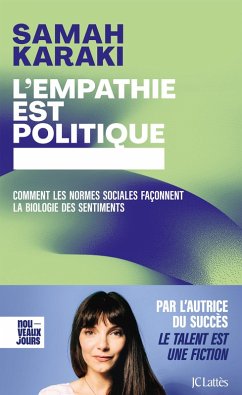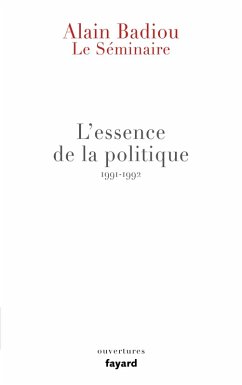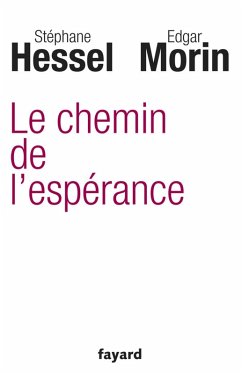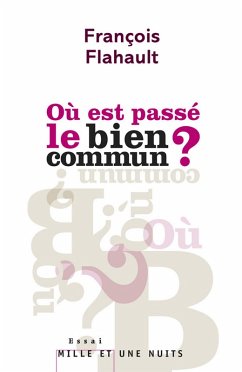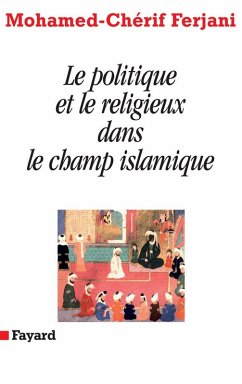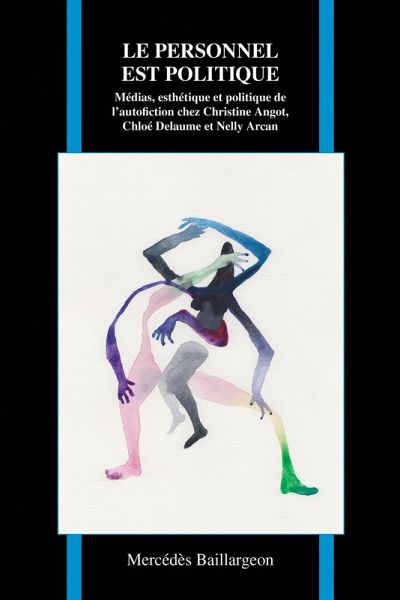
Le personnel est politique (eBook, ePUB)
Médias, esthétique et politique de l'autofiction chez Christine Angot, Chloé Delaume et Nelly Arcan
Versandkostenfrei!
Sofort per Download lieferbar
0,00 €
inkl. MwSt.
Weitere Ausgaben:

PAYBACK Punkte
0 °P sammeln!
Regardant les questions de témoignage, de confession, de traumatisme, de sexualité et de violence dans les oeuvres (semi-)autobiographiques, ce livre explore la co-construction d'identités personnelles et collectives par des femmes écrivains à l'ère des médias et de l'autoreprésentation. À une époque où la littérature française est souvent accusée d'être égocentrique et trop narcissique, Mercédès Baillargeon avance que l'autofiction des femmes a été reçue avec controverse depuis le tournant du millénaire parce qu'elle perturbe les idées reçues à propos des identités n...
Regardant les questions de témoignage, de confession, de traumatisme, de sexualité et de violence dans les oeuvres (semi-)autobiographiques, ce livre explore la co-construction d'identités personnelles et collectives par des femmes écrivains à l'ère des médias et de l'autoreprésentation. À une époque où la littérature française est souvent accusée d'être égocentrique et trop narcissique, Mercédès Baillargeon avance que l'autofiction des femmes a été reçue avec controverse depuis le tournant du millénaire parce qu'elle perturbe les idées reçues à propos des identités nationale, de genre et de race, et parce qu'elle questionne la distinction entre fiction et autobiographie. En effet, ces écrivaines se distinguent du reste de la production française actuelle, car elles cultivent une relation particulièrement tumultueuse avec leur public, à cause de la nature très personnelle, mais également politique de leurs textes semi-autobiographiques et à cause de leurs « performances » comme personnalité publique dans les médias. On y examine donc simultanément la façon dont les médias stigmatisent ces écrivaines ainsi que la manière dont ces dernières manipulent la culture médiatique comme une extension de leur oeuvre littéraire. Ce livre analyse ainsi simultanément les implications textuelles et sociopolitiques qui sous-tendent la (dé)construction du sujet autofictionnel, et en particulier la façon dont ces écrivains se redéfinissent constamment à travers la performance rendue possible par les médias et la technologie. De plus, ce travail soulève des questions importantes par rapport à la relation complexe qu'entretiennent les médias avec les femmes écrivains, en particulier celles qui discutent ouvertement de traumatisme, de sexualité et de violence, et qui remettent également en question la distinction entre réalité et fiction. Cet ouvrage contribue à une meilleure compréhension des rapports de pouvoir mis en jeu dans l'autofiction, tant au niveau de la production que de la réception des oeuvres. Privilégiant l'autofiction comme phénomène principalement français, cet ouvrage s'intéresse à la valeur politique de ce genre semi-autobiographique par-delà sa mort annoncée avec la disparition de la littérature engagée de l'après-guerre et des avant-gardes des années 50-60, dans le contexte français et francophone actuel, traversé par une crise des identités, le multiculturalisme et une redéfinition du nationalisme à travers l'écriture.
Looking at questions of testimony, confession, trauma, sexuality, and violence in (semi-) autobiographical works, this book explores the co-construction of personal and collective identities by women writers in the age of self-disclosure and mass media. In a time when literature is accused of being self-centered and overly narcissistic, women's autofiction in France since the turn of the millennium has been received with controversy because it disrupts readily accepted ideas about personal and national identities, gender and race, and fiction versus autobiography. Through the study of polemical writers Christine Angot, Chloé Delaume, and Nelly Arcan, Mercédès Baillargeon contends that, by recounting personal stories of trauma and sexuality, and thus opposing themselves in opposition to social convention, and by refusing to dispel doubts regarding the fictional or factual nature of their texts, autofiction resists and helps redefine categories of literary genre and gender identity. This book analyzes concurrently the textual and sociopolitical implications that underlie the (de)construction of the autofictional subject, and particularly how these writers constantly redefine themselves through performance and self-fashioning made possible by media and technology. Moreover, this work raises important questions relating to the media's complicated relationship with women writers, especially those who discuss themes of trauma, sexuality, and violence, and who also question the distinction between fact and fiction. Proposing a new understanding of autofiction as a form of littérature engagée, this work contributes to a broader understanding of the French publishing establishment and of the literary field as a cultural institution, as well as new insight on shifting notions of identity, the Self, and nationalism in today's ever-changing and multicultural French context.
Looking at questions of testimony, confession, trauma, sexuality, and violence in (semi-) autobiographical works, this book explores the co-construction of personal and collective identities by women writers in the age of self-disclosure and mass media. In a time when literature is accused of being self-centered and overly narcissistic, women's autofiction in France since the turn of the millennium has been received with controversy because it disrupts readily accepted ideas about personal and national identities, gender and race, and fiction versus autobiography. Through the study of polemical writers Christine Angot, Chloé Delaume, and Nelly Arcan, Mercédès Baillargeon contends that, by recounting personal stories of trauma and sexuality, and thus opposing themselves in opposition to social convention, and by refusing to dispel doubts regarding the fictional or factual nature of their texts, autofiction resists and helps redefine categories of literary genre and gender identity. This book analyzes concurrently the textual and sociopolitical implications that underlie the (de)construction of the autofictional subject, and particularly how these writers constantly redefine themselves through performance and self-fashioning made possible by media and technology. Moreover, this work raises important questions relating to the media's complicated relationship with women writers, especially those who discuss themes of trauma, sexuality, and violence, and who also question the distinction between fact and fiction. Proposing a new understanding of autofiction as a form of littérature engagée, this work contributes to a broader understanding of the French publishing establishment and of the literary field as a cultural institution, as well as new insight on shifting notions of identity, the Self, and nationalism in today's ever-changing and multicultural French context.
Dieser Download kann aus rechtlichen Gründen nur mit Rechnungsadresse in A, D ausgeliefert werden.




